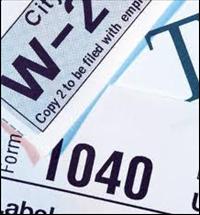
submitted by Brian J. Delaney, Esq.
It looks like Congress will be extending the payroll tax cut through the end of 2012. Many people assume it is a good thing, but don’t understand how it affects their tax returns. This payroll tax cut actually went into effect in January in 2011. Will you see a bigger tax refund? For most people, the answer is no. In fact, some people will be paying more in tax this year as opposed to last year! I prepare tax returns for many of my clients and I have quickly realized that a number of them will end up paying more than last year. Why? Read on…
The reason why most people will not see a benefit is because the payroll tax cut was already paid during the year. Do you remember it? Probably not… Take a look at your paystub and look at the various deductions. You will see either a deduction for “FICA” (Federal Insurance Contributions Act) or two separate deductions for “Medicare” and “Social Security.” These are known as payroll taxes. I still remember receiving my first pay check from Star Market when I was 16…I was so angry that this “FICA” organization was taking a big chunk out of my take home pay!
Payroll taxes are paid equally between the employer and employee. Typically, you will pay 6.2% of your wages in social security tax and 1.45% in Medicare tax, and your employer pays the same. The employer portion is not shown on your paycheck or W-2. If you’re self-employed, you have to pay the entire amount 15.3% yourself.
Prior to 2011, Congress had passed a number of stimulus-type tax breaks for individuals. In 2009 and 2010, the “Making Work Pay Credit” gave workers a tax credit of up to $400 (individuals) and $800 (married couples). The “Making Work Pay Credit” was an income tax credit. The current payroll tax cut reduces an employee’s social security tax contribution from 6.2% to 4.2%.
How does the payroll tax cut work in real life? Assume you make $52,000 and are paid bi-weekly for a total of 26 paychecks per year. Normally, the social security portion of the payroll tax would be $124.00 (6.2% of $2,000.00). With the payroll tax cut in place, the social security tax would be $84.00, for a savings of $40 per paycheck (or $1,040.00 per year). Clearly, that’s a good a chunk of change.
OK, getting back to this year’s tax return…unless you are self-employed and need to report self-employment taxes on your Federal 1040, the payroll tax does not affect your tax return at all. If you’re income is similar to last year’s, then you are actually paying more in income tax because the $400 tax credit from 2009 and 2010 is no longer in effect. However, the payroll tax break you received during the year was likely higher.
So which taxpayers got shafted by the payroll tax cut? If you are a local or state government employee (such as a teacher, police officer, or fireman, etc) and you pay into the state pension system, then you do not pay social security tax. Last year’s tax credit was available for anyone who had wages, but this tax break only applies if you pay social security tax. If you didn’t pay social security tax, then you’re not getting the tax break. Sorry!
If you have any questions regarding tax preparation, please do not hesitate to contact me at bdelaney@delaneylawoffice.com.